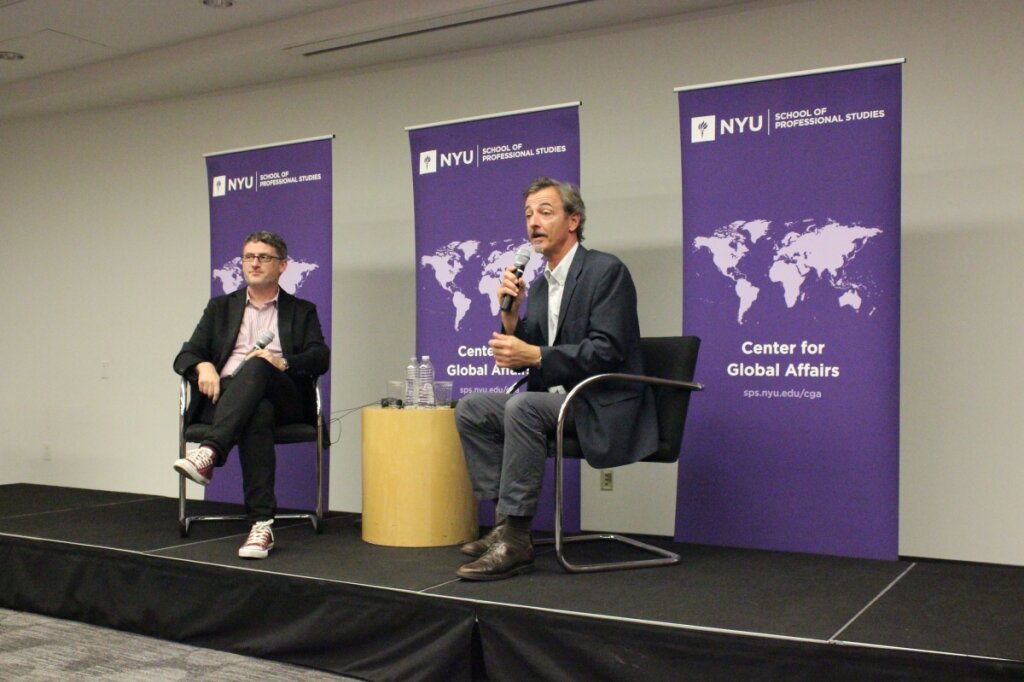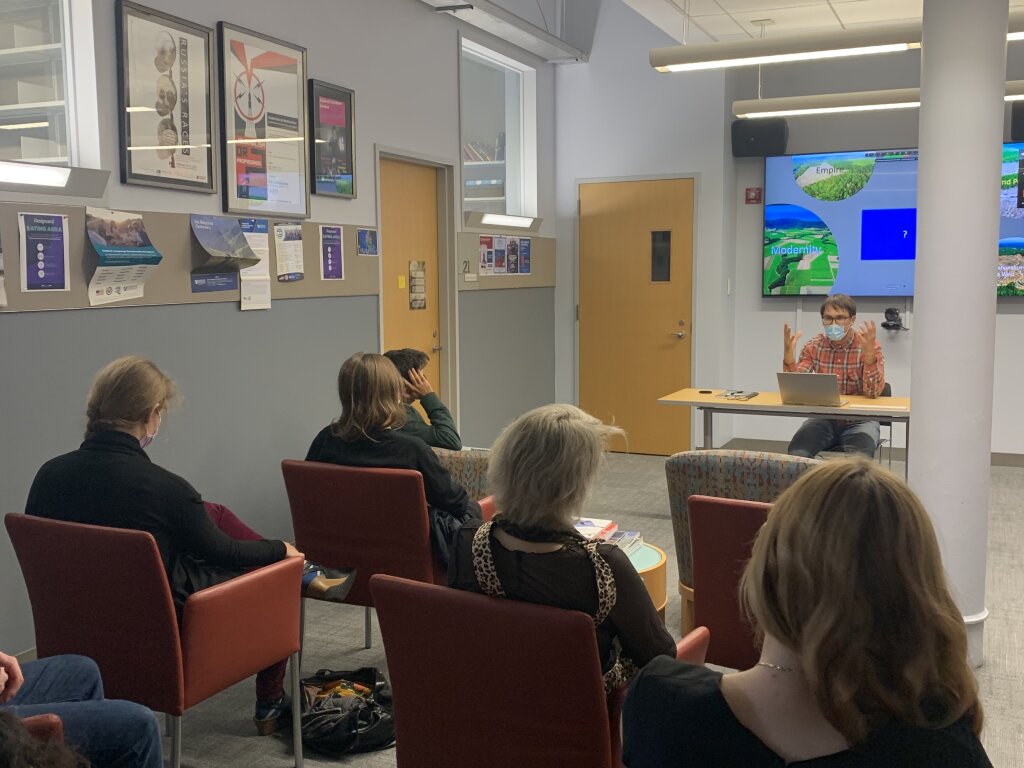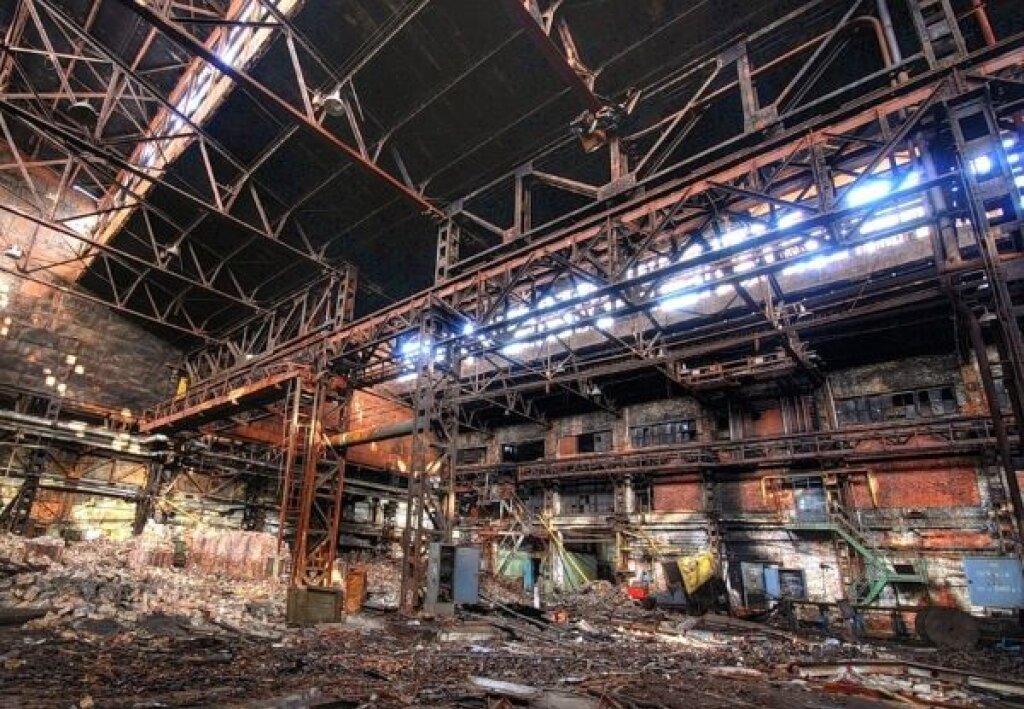On Sept. 29 the NYU School of Professional Studies Center for Global Affairs and the Jordan Center teamed up to present the first installment of Revisiting Russia, a special series of three conversations on contemporary Russia co-sponsored by the two institutions. The first event, titled “Where Is Putin Leading Russia?,” saw leading Russian affairs expert Mark Galeotti take center stage for a discussion of the factors shaping the politics of Vladimir Putin and the future of the country. Professor Yanni Kotsonis, Director of the Jordan Center, moderated the talk, which is part of the program of celebrations marking the 10th anniversary of the Center for Global Affairs.
Galeotti, who is a professor at the Center for Global Affairs and has previously served as an advisor to the British Foreign Office, drew upon his recent experience as a visiting scholar at the Moscow State Institute of International Relations (MGIMO), in the Russian capital, to illustrate how current circumstances are affecting Russia’s political trajectory and its society. As humorously pointed out by Kotsonis, Galeotti’s arrival in Moscow last January was characterized by “suspiciously good timing”, anticipating only by a few weeks the events that have led to the sharp deterioration of the relations between Russia and the West in connection with the Ukrainian crisis.
“It provided this incredible opportunity to experience just how a state shifts gear, and it shifts gear not so much because of the policy, but because of how people perceive the situation,” Galeotti said about his stay in Russia.
The professor explained how a process of “competitive caution” is currently developing among the members of the Russian elites. Emphasizing how the lines of what is admissible in Putin’s Russia appear to be shifting every week, he described the current atmosphere within the country by drawing an analogy with a group of men chased by a pack of wolves. “You don’t need to be the fastest runner, you just have to be not the slowest runner,” he said.
Looking at Russia’s current policies, Kotsonis pointed out how Putin’s third presidency reveals lack of a grand strategy, being mainly reactive. Galeotti noted how, while during his first two mandates Putin saw a partnership with the West as necessary and possible, he now looks at the United States and the European Union with suspicion. The current situation in Ukraine and Putin’s support of pro-Russian forces within the country has exacerbated this attitude. Galeotti recognized, however, that the West’s treatment of Russia after its attempts to defuse the situation in Syria caused some frustration in Moscow, contributing to the current atmosphere of growing mutual distrust.
He also stressed how the new Putin seems to have been deeply affected by the street protests that swept across Moscow between 2011 and 2013, when the presidency was handed back to him after an interlude under current Prime Minister Dmitry Medvedev.
In Galeotti’s interpretation, however, elites - and not the masses - are what could mark the end of Putin’s tenure. In his opinion, the final chapter of the Putin era has already begun, even though it is impossible to establish when it will reach its conclusion. Galeotti envisages a scenario similar to those that led to the downfalls of Nikita Khrushchev and Margaret Thatcher, with the elites staging an insider coup. “It will have to be something that slowly emerges; that is spoken about in whispers in corners of corridors, in fishing trips in distant dacha locations [...] and it would have to involve the security apparatus,” he said.
It is the elites’ interest in protecting “the state that protects their own interests” that will drive the change, according to Galeotti. In his experience, signs of concern can already be detected in today’s Russia that could point at the upper circles moving in that direction. As the economic sanctions make Russia look inward and take steps to turn the country into a sanction-proof system (for example by discouraging foreign travel and prompting the elites to return their asset to Russia from abroad), the elites’ fondness for a Western lifestyle could prove to be a liability, Galeotti believes.
After the talk, Galeotti took questions from the audience and was able to expand on some other issues related to current affairs in contemporary Russia. After describing the reset policy initiated by U.S. president Barack Obama in 2008 as a “dramatic blunder”, Galeotti commented on an interview given by Russian Foreign Minister Sergey Lavrov during the recent 69th United Nations General Assembly at the UN headquarters in New York, in which he called for a “reset 2.0.” While allowing that Lavrov’s words were a clear attempt at “trolling” the West, he also noted that they show a desire by Russia to obtain an international amnesty and start anew. “What Russia wants is the reset, but a reset that says: ‘let us all let bygones be bygones’,” Galeotti said.
With no amnesty in sight, Russia is forced to rely on its internal resources and slash budgets, while also seeking investment opportunities in the East. Galeotti noted how these strategies, however, lack a careful evaluation of their long-term impact and are driven by short-term necessity. Despite the current outlook, Galeotti was able to conclude on a mildly positive note. “The grand trajectory of Russia is moving towards western standards and norms,” he said when asked about what Russia will look like when Putin is no longer in power.



